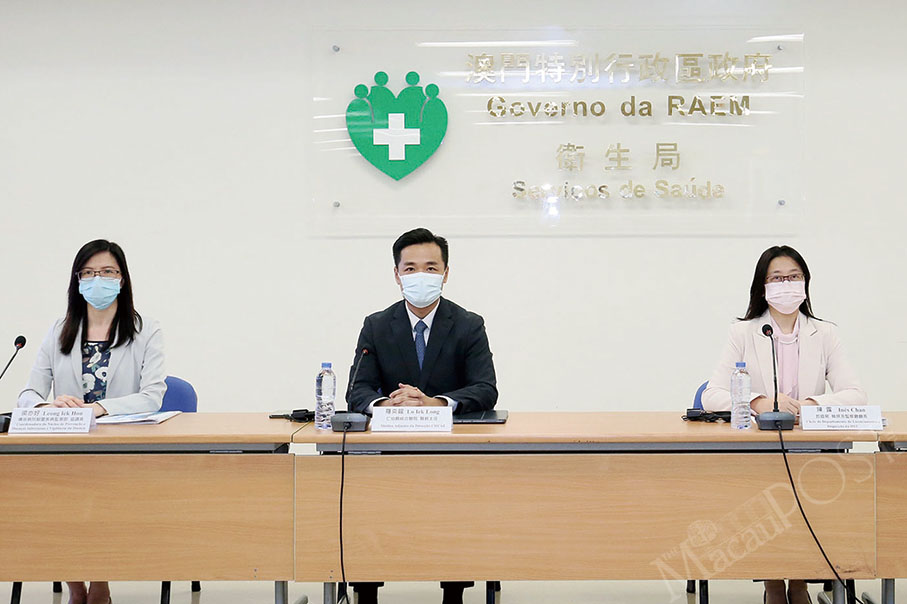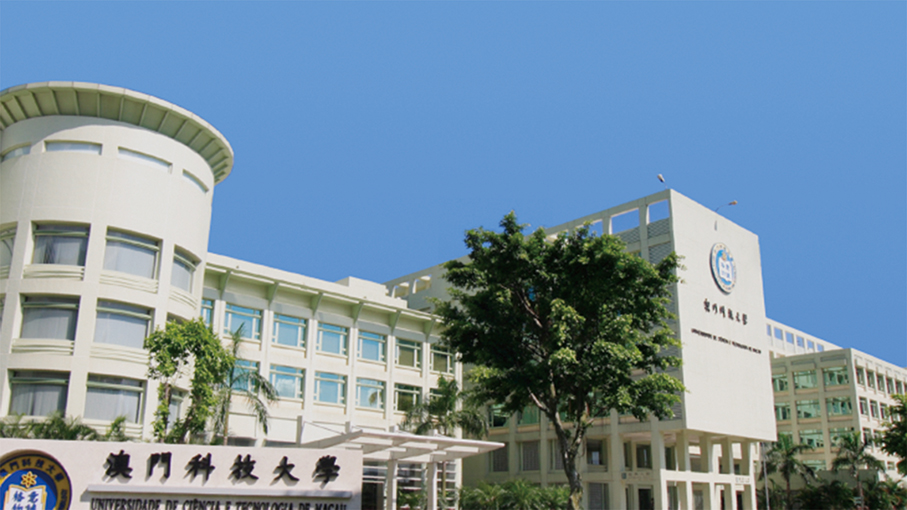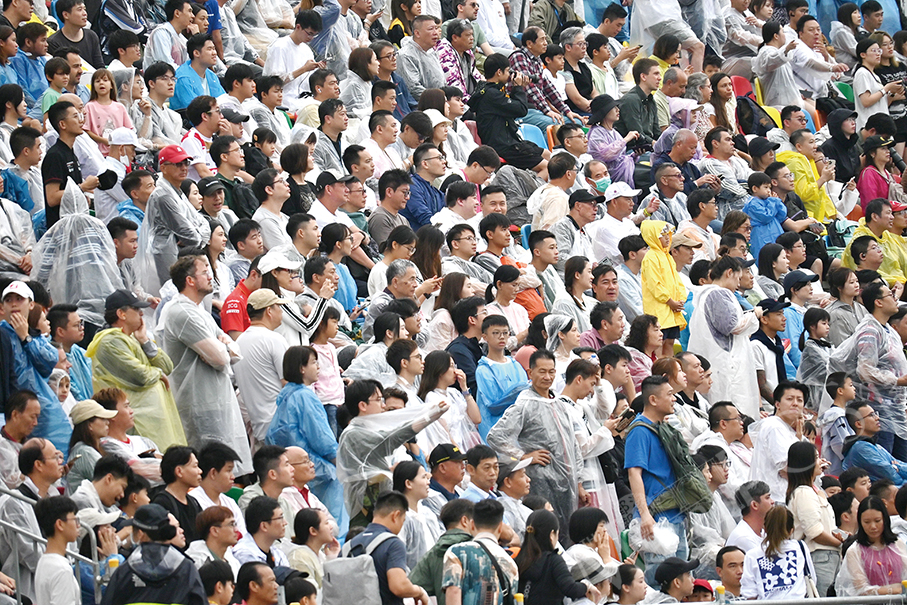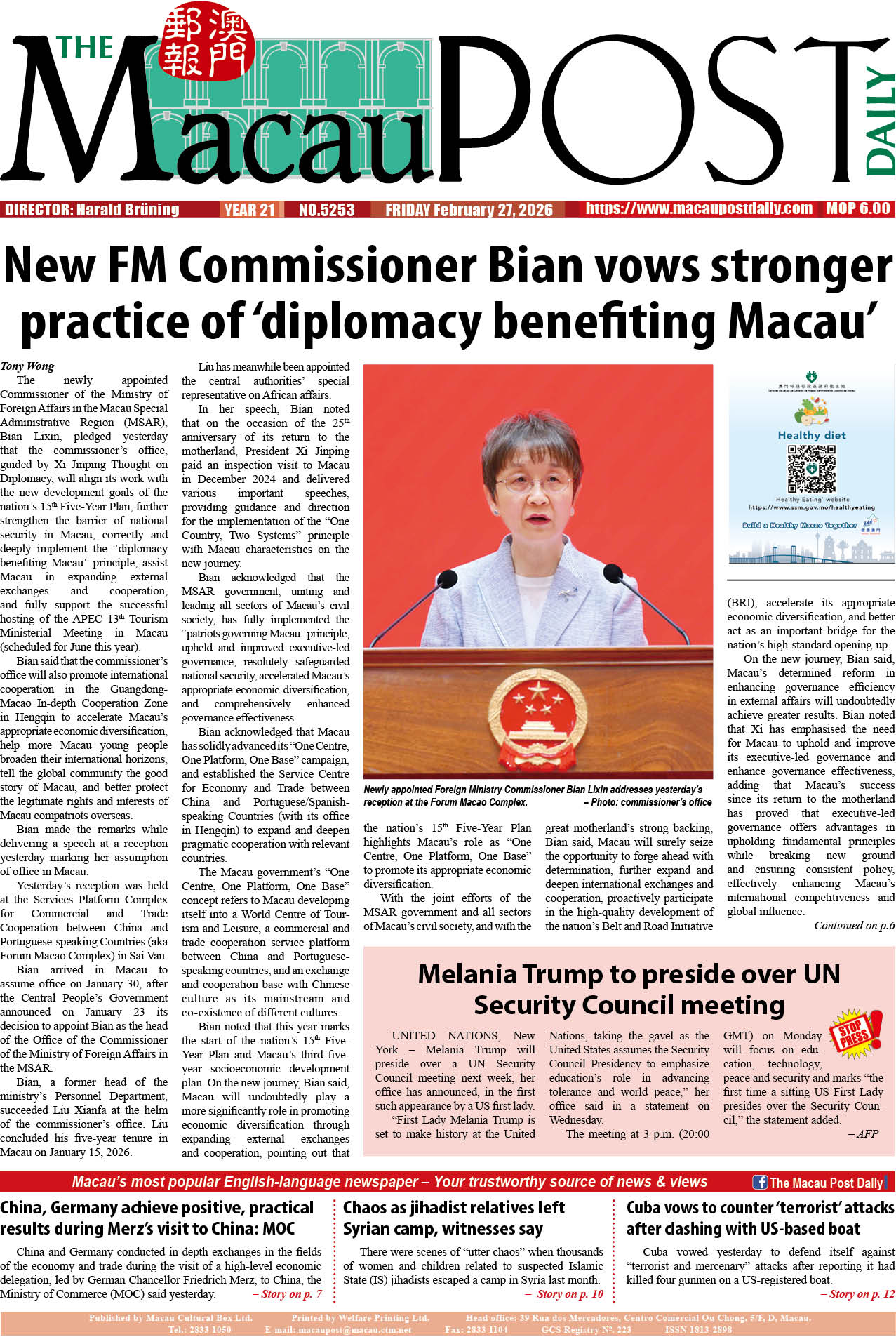Addressing yesterday’s daily press conference about Macau’s novel coronavirus (COVID-19) situation, the Health Bureau’s (SSM) Control of Communicable Diseases and Surveillance of Diseases Department Coordinator Leong Iek Hou said that residents could enjoy their shopping activities, as the government’s consumption subsidy smartcard scheme starts today, provided that they continue to adhere to the government’s COVID-19 prevention measures.
When asked by the media about today’s commencement of the government’s consumption subsidy smartcard scheme possibly resulting in many residents going out shopping, Leong said that the government thanks residents for their perseverance for already adhering to the COVID-19 prevention measures for three months since the COVID-19 epidemic emerged in Macau in late January. Leong said that the government had noticed that despite the fact that the epidemic in Macau has eased, Macau residents are still wearing facemasks when out and about, and they are also maintaining good personal hygiene.
Leong said that residents’ personal hygiene measures over the past three months have gradually become a habit. Leong said that the government hopes that residents will continue to keep up their personal hygiene measures as the COVID-19 epidemic overseas has still not eased.
Leong urged residents to adhere to several “principles” when going out shopping, namely keeping a certain distance from others, avoiding gatherings and ensuring that their hands are clean particularly before touching their eyes, nose and mouth. Leong said she hoped that residents will still keep up their good personal hygiene in the future after the COVID-19 pandemic is over.
“I hope that everybody can happily shop during their holiday while persevering in maintaining their anti-COVID-19 spirit,” Leong said.
Basketball, football ‘entail increased transmission risk’
Meanwhile, when asked by the media when public basketball courts across the city could reopen, Leong replied that basketball and football are sports activities where players have close contact with each other, entailing an increased risk of respiratory droplet transmission. Leong said that in the phased reopening of sports facilities in the mainland and other neighbouring regions, facilities for sports activities where players do not have close contact with each other reopened first before the later reopening of facilities for sports involving a higher COVID-19 transmission risk.
According to a statement by the Sports Bureau (ID) on Wednesday, various kinds of public sports facilities have gradually reopened since early March, such as badminton courts, tennis courts, table tennis areas and running tracks. According to the statement, the government’s bowling alley in Cotai reopened and exercise bicycles in its Olympic Sports Centre in Taipa came back into use yesterday.

Vaccine development
Meanwhile, Alvis Lo Iek Long, a clinical director of the public Conde de São Januário Hospital Centre, said that it would take a long time before a COVID-19 vaccine is successfully developed and can be widely used on human beings.
Lo made the remarks when replying to a question from a reporter who asked him to comment on international news reports earlier this week according to which a COVID-19 vaccine could be available for use by September.
Lo pointed out that according to information from the World Health Organisation (WHO), some 70 COVID-19 vaccines are currently under development around the globe, with some of them already being tested in clinical trials. Lo noted that the development of a vaccine comprises three major stages. After a vaccine has been successfully made, it will have to undergo animal testing, Lo noted, adding that if the animal testing is successful the vaccine will then have to go through clinical trials on human beings in three phases, before it could finally be widely put to use on humans.
In the first phase of a vaccine’s clinical trials, the researchers examine whether it will be safe for human beings, namely whether the use of the vaccine will have “obvious” side effects on human beings, Lo said.
In the second phase – which requires more people to participate, according to Lo, the researchers examine how the vaccine is injected to provide the most effective results. “For instance, whether only one shot, or two shots will make the vaccine effective. If the vaccine has to be injected twice, how long the interval between the two injections should be,” Lo said.
In the third phase, the researchers confirm the vaccine’s effectiveness based on a sample of at least several thousand people, Lo said.
Lo said that according to previous experiences, it will normally take 12 to 18 months for the three phases of a vaccine’s clinical trials to be completed at the fastest.News agencies reported yesterday that a Chinese company as well as a US-German joint venture are getting close to a COVID-19 vaccine.
1 more discharged, only 10 still in hospital
Meanwhile, Lo announced the discharge of Macau’s 20th COVID-19 patient yesterday, a 20-year-old local male student who returned from the United Kingdom, taking the number of those no longer requiring hospitalisation to 35 among Macau’s total of 45 COVID-19 cases.
According to Lo, the man met the official criteria for a COVID-19 patient to be discharged after 40-day treatment in the isolation ward. He was transferred to the Health Bureau’s Public Health Clinical Centre in Coloane yesterday for 14 days of recovery period isolation.
Following yesterday’s discharge of the student, just 10 COVID-19 patients remain hospitalised. Only one of the patients still in hospital had previously been in a serious condition. That patient’s condition is improving, Lo stressed.
According to Lo, the student discharged yesterday departed from the United Kingdom on March 16 for Hong Kong. After arriving at Hong Kong’s airport the next day, he returned to Macau via the Hong Kong-Zhuhai-Macau Bridge (HZMB), after which he went into 14 days of quarantine and medical observation at a designated hotel, before testing positive for COVID-19 on March 22.
Only Pousada Marina Infante still used as quarantine hotel
Meanwhile, Inês Chan Lou, who heads the Licensing and Inspection Department of the Macau Government Tourism Office (MGTO), announced during yesterday’s press conference that the 300-room Golden Crown China Hotel opposite the airport in Taipa, one of the government’s “quarantine hotels”, will return to its normal hospitality role, following disinfection and cleaning.
At the peak in late March, there were 12 “quarantine hotels” with about 3,000 guestrooms when some 2,800 people were undergoing their 14 days of quarantine and medical observation.
Since early last month when Metropole Hotel in the city centre became the first of the government’s “quarantine hotels” to return to its normal hospitality role, more hotels have followed suit one after another once all those who completed their 14-day quarantine and medical observation had checked out.
The remaining “quarantine hotel” is the 298-room Pousada Marina Infante in Cotai.
Chan said that as of yesterday afternoon 74 people were still undergoing their 14 days of quarantine and medical observation in the Pousada Marina Infante hotel – comprising 46 Macau residents and 28 non-resident workers and visitors.
Meanwhile, Lo said that the 47-year-old Spanish tourist (Macau’s 12th COVID-19 case) who was discharged on Easter Sundays has applied to defer paying his hospital bill of 44,000 patacas for another 30 days. He completed his 14-day recovery period isolation in the Coloane Public Health Clinical Centre earlier this week.







